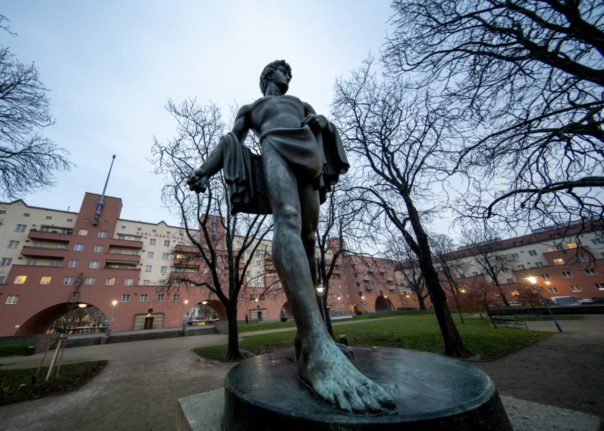According to figures from Spain’s Land and Housing Observatory, in 2020 just 2.5 percent of total constructions in Spain were for social housing, far lower than in countries such as Austria, where it was 24 percent, the Netherlands, with 30 percent, and Denmark at 20.9 percent.
Spain is one of a small handful of EU countries that have surprisingly low social housing provisions. Spain ranks 18th in the EU overall and is joined at the bottom of the table by countries such as Romania (1.5 percent), Estonia (1.7 percent), Croatia (1.8 percent) and Portugal (2 percent).
Spain’s 2.5 percent figures are also much lower than the wider European average of 9.3 percent. In recent years, Spain has not even managed to complete 10,000 social housing units per year, compared to 60,000 a decade ago.
READ ALSO – EXPLAINED: How Spain plans to address its huge lack of social housing
Furthermore, public housing has become increasingly privatised in recent years, affecting most of the almost 2.5 million subsidised homes built since 1981, when the first plan was approved. In 2012, the construction of social housing plummeted and dropped from 50,000 homes annually to just 9,200 in 2022.
The Viennese model
For decades now, Vienna, the Austrian capital, has increased its stock of price-controlled social housing and has stood out for its housing policy.
Although there is social housing throughout the country, the majority of it is concentrated in the capital city.
The Vienna City Council has become the biggest homeowner in Europe – around 60 percent of residents live in one of 220,000 properties subsidised by the public sector, and the city invests up to €600 million annually in affordable housing models.
By increasing social housing and limiting rent, the value of housing has also been limited and prices have been regulated. For example, in Vienna, rent is around €9 per m/2, according to the consulting firm Deloitte.
This figure is much lower than that of the rest of the European capitals, compared to London or Paris, for example, where the rental price per m/2 is around €30. In comparison, rent in Barcelona and Madrid is around €17 and €14 m/2 respectively.
The requirements to be able to access social housing in Vienna are also very broad. Basically, you need to be 17 years old or older, be registered Vienna and earn more than €43,000 net annually. Rent can also not represent more than 30 percent of your income.
READ ALSO: Spain needs to build 1.2 million affordable rental homes in a decade
How Spain is planning on replicating the Vienna model
Spain, like many EU countries, has begun to turn towards the Viennese model.
Madrid in particular hopes to increase the real estate stock by 70,000 homes in four years, of which up to 40,000 will be dedicated to social housing according to regional president Isabel Díaz Ayuso.
Like in Vienna, Madrid hopes to balance the real estate market naturally without limiting prices. For example, in Vienna where the private real estate stock has been regulated, 60 square meter homes can vary between €600 and €700 per month. This is almost impossible in Madrid and Barcelona, where a home with the same characteristics can exceed more than €1,000 per month.
The Spanish government recently approved a plan to allocate 50,000 ‘Sareb’ homes to bolster its dwindling social housing stock. La Sociedad de Gestión de Activos Procedentes de la Reestructuración Bancaria or ‘Sareb’ was created eleven years ago to buy real estate assets from banks that went bankrupt during the 2008 financial crisis, and has been state-run since 2022.
Sánchez followed up on this 50,000 pledge by announcing the financing of a further 43,000 homes for social housing paid for with €4 billion of European funds.
“I want to announce that, in addition to the mobilisation of 50,000 Sareb homes, we are going to finance the development of another 43,000 new homes for social rent and rent at affordable prices,” the Prime Minister said.
He also criticised Spain’s “embarrassing” social housing stock compared to Europe, and reinforced his “commitment” to “move forward so that housing is a right and not a problem for the majority of citizens”.
Having an extensive public housing stock allows prices to be lowered and ensures that there’s sufficient supply.
Christian Schantl, the head of the International Relations department of the public company Wiener Wohnen, the entity that manages public rentals in the city of Vienna, has advised Spain that to do this, they should not sell public housing under any circumstances.
In an interview with El País he said: “You cannot completely copy and paste the system, it would not work. One thing [the Spanish Government] should not do is sell its public housing. This is very important because many cities in Europe have made that mistake and are now facing serious problems. So that’s the first thing: never sell what you have. And then, there are some elements that are important to take into account, such as the financial situation, the necessary land, the legal framework and housing policies,” he continued.



 Please whitelist us to continue reading.
Please whitelist us to continue reading.
Member comments